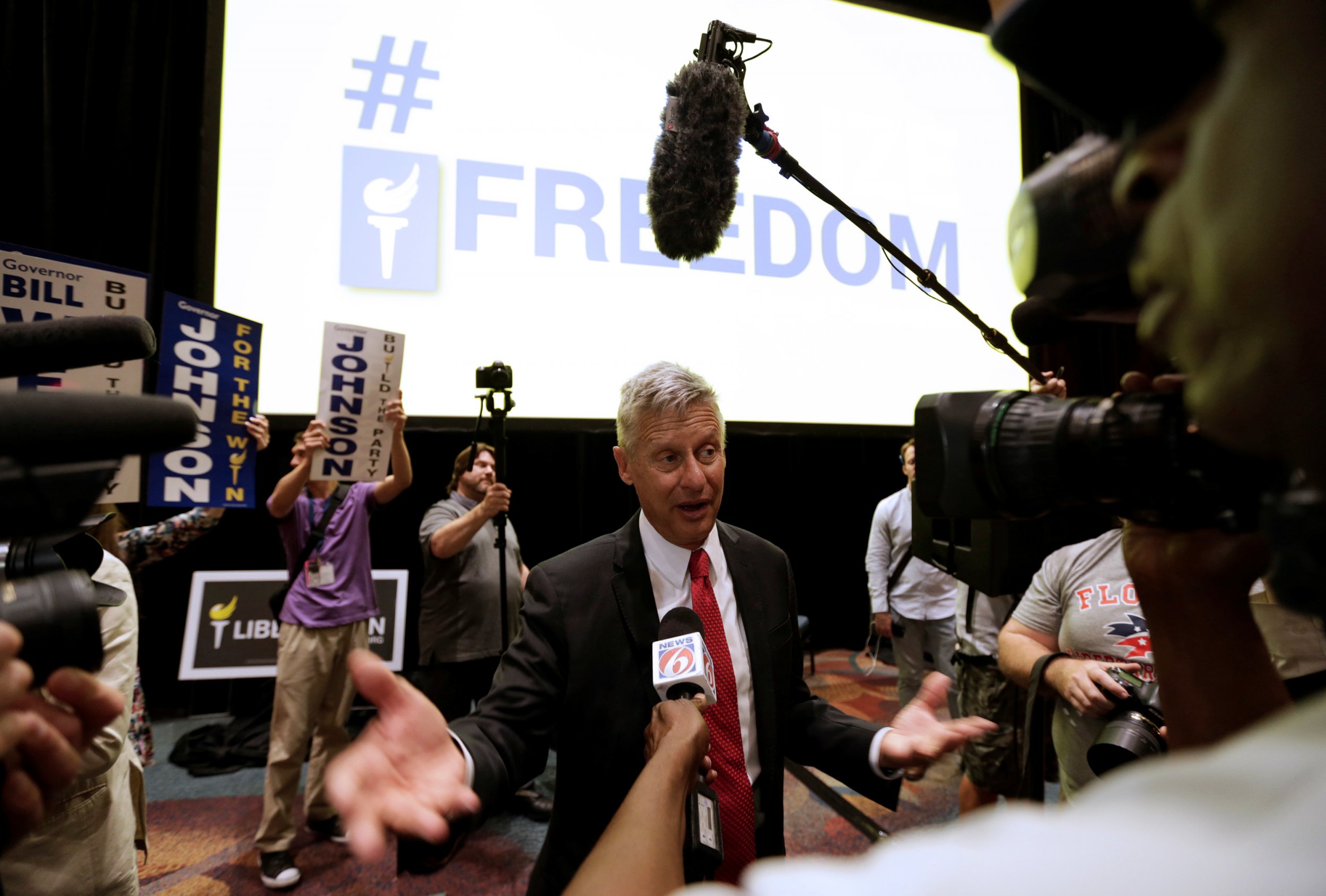
It's been 48 years since a third-party presidential candidate managed to win votes in the electoral college. That was George Wallace's 1968 presidential campaign, during which the Alabama governor won 13.5 percent of the vote and picked up 46 electoral votes in the South. Ross Perot may have won 19 percent of the vote in 1992, but his supporters were spread out, and he never won a state.
The Libertarian Party has been around since 1971, and it's usually an afterthought in American politics. Its candidates have been little known, save a few flickers of mini celebrity (Ron Paul was the party's presidential nominee in 1988, and David Koch was the vice presidential nominee in 1980).
This year, it's obviously different. The Libertarian Party has nominated two former two-term governors, Gary Johnson and Bill Weld, and on Wednesday night the two took questions at a CNN Town Hall hosted by Chris Cuomo.
In the age of Donald Trump, the two were refreshingly gentle. Asked to offer their opinions about President Barack Obama, Johnson, the former governor of New Mexico, said he was a "good guy." Weld called him a "statesman." Both had equally kind words for Hillary Clinton—especially Weld, who first met her while working on the House impeachment committee in 1974 where they were young staffers. The Clintons and Welds have been friends ever since. Weld resigned his governorship in 1997 to become President Bill Clinton's ambassador to Mexico, although his bid never made it out of committee because Senator Jesse Helms blocked it.
Both men dissed Donald Trump as authoritarian and crazy. Weld called him a "huckster" and likened his proposed deportation of undocumented aliens to Adolf Hitler's round-up of the Jews. (The round-up part, not the genocide part, Weld allowed.)
Since its founding, the Libertarian Party has been a crucible for fights about the nature of freedom. Some members have criticized Johnson for supporting drivers' licenses (too much government intervention) and the Civil Rights Act (an abridgement of freedom of assembly). Paul has been famously incensed about the Federal Reserve and long advocated a return to the gold standard.
Johnson and Weld haven't weighed in on either. But their platform lacks the privatize-sidewalks quality of most of the party's debate. Their focus on a platform that's socially liberal and fiscally conservative is more like John Anderson's presidential run in 1980. A moderate Illinois congressman who ran in the Republican primaries and then launched an independent bid, Anderson was a favorite of liberals and moderate Republicans who couldn't stomach Ronald Reagan or Jimmy Carter. He polled north of 20 percent for much of the summer of 1980 and even managed to get into one of the presidential debates. But in the fall, he faltered and won just 7 percent of the vote. He never won a state.
Johnson and Weld face the same problems that bedeviled Anderson, but they have some advantages. Trump and Clinton are terribly unpopular, and the Libertarian candidates haven't been on the scene long enough for voters to tire of them. They also have potential upsides. The super WASPy Weld had an ancestor in the Harvard Class of 1650. But with his ruddy looks and side career writing spy novels, he's an engaging figure. So too is Johnson, who has climbed the highest peaks on seven continents, including Everest. That's not a typical qualification for being president, but it's a rather charming contrast to Trump's relentless efforts to brand his name on almost everything and Clinton's dutiful march toward the White House.
Unfortunately for Johnson and Weld, Americans may not be ready for a Libertarian ticket. Many in the U.S. reject Big Government in theory but often love it in practice, from guaranteed student loans to Social Security. Some polls show more than 10 percent of Bernie Sanders supporters favor Johnson-Weld over Clinton. But that could fade when they hear more about the mammoth budget cuts the Libertarians are proposing, or how they want to replace income taxes with a consumption tax. Are voters going to be happy with cutting government when they realize it's their benefits that could be disappearing?
Today, Johnson and Weld are on the state ballots, but getting into the debates, which require polling in the 15 percent range, might prove more difficult in the fall. And then there's that electoral college problem that made life so hard for Perot, Anderson and all the insurgents before them. You need to win states to have a chance, and it's hard to see them picking any up. The networks seem to know it too: They haven't even given the Libertarians a color on their red-and-blue electoral maps. They probably won't have to.
Uncommon Knowledge
Newsweek is committed to challenging conventional wisdom and finding connections in the search for common ground.
Newsweek is committed to challenging conventional wisdom and finding connections in the search for common ground.
About the writer
Matthew Cooper has worked for some of America's most prestigious magazines including Time, The New Republic, National Journal, U.S. News ... Read more
To read how Newsweek uses AI as a newsroom tool, Click here.








